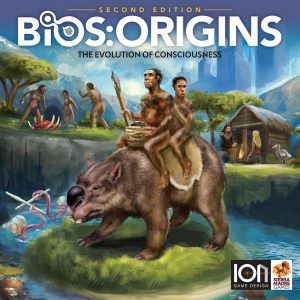 Civilization board games generally have a recognizable composition. Technologies that are being developed or invented. Players may diverge into different specializations due to their strategic paths. Historic monuments will be built and fall to rumble at the hands of Napoleon or Churchill.
Civilization board games generally have a recognizable composition. Technologies that are being developed or invented. Players may diverge into different specializations due to their strategic paths. Historic monuments will be built and fall to rumble at the hands of Napoleon or Churchill.
But what about the minds of the people that players represent in a civilization game? While we read about and play as the leaders of the historic empires and nations, even the common individual of those places and times would have an emotional investment in what is happening. What of Earth? The planet has never remained static in terms of climate, culture, and worldwide phenomenons.
Bios: Origins Second Edition looks to do all of this. Players will play as different types of humanoids that develop thoughts, specializations, ideas, and inventions across the span of four epochs. They’ll be competing against the environment, disease, chaos, philosophy, revolution, and each other.
Gameplay Overview:
I describe Bios: Origins as “a game of threes.” There are three areas of focus, three different disciplines where cards could be played, three steps to a turn, three parts to the mainboard, and three possible ways to score at a game’s end.
A game turn follows three phases. Beginning with the optional Challenge the Gods phase, this where board-shifting events alter the landscape and players participate in a once-around action to gain the card. The active player then takes activities, starting at the bottom card of their ruling class and moving up. Each card has a row of possible actions players may take before moving up to the next row of options. Once finished with activities, migrants may starve depending on the number of pieces in a single hex and the footprint track of a player, and then the market where cards can be purchased will be refreshed.
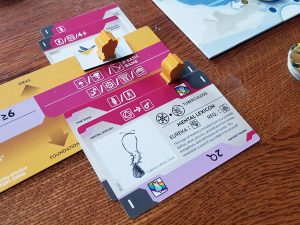
Players have two personal areas of focus: their tableau for cards and their brain placard. Each player is dealt a crown to determine who is the start player and what discipline begins as their ruling class. A discipline has two included rows of possible actions, but to gain more rows, cards must be bought from the market using available Free Will or won through the Challenge the Gods auction. The market is three rows, with the lowest row needing a single Free Will pawn to invent and the top row needing three pawns, whether from one player or multiples. When a card is invented, all players with a pawn on the card are awarded a bonus, called a Eurika. If the person who invented it meets the requirements, they may take the card and place it in their tableau, but only in the column of their ruling class if it can be oriented to match the color.
Players begin with just one Free Will to spend. The way more is gained is through the brain placard. The other six available pawns begin in Vocabulary and Emotions, lower down on the brain placard. Some of the actions players can take or be awarded through Eurika could be to move those pawns further up the placard to become spendable Free Will, or over become Mysticism (more on that later).
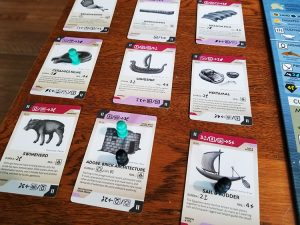
Most of the actions influence the final focus, the mainboard. Players begin with one of their migrant figures in designated starting areas. Actions can be taken to move and create migrants about the board. Some actions move a player further up one of six tracks, all of which give players better stats and specific abilities as the game progresses. Other actions influence the three routes of scoring of the three different epochs, Mysticism, Urbanization, and Diversity.
At an epoch’s end, scoring will happen in the matching discipline. As an example, during the end of Epoch 1, Mysticism is the method of scoring. The amounts are compared, and victory points are awarded to whoever has the most. VP totals are determined by the number of players they scored more than, so depending on player count, the leader will score the most and if players tie, they will score fewer points. Each epoch’s scoring will happen like this, but for each discipline. In the fourth and final epoch, each player will compare all three of their scoring routes, which includes the VPs earned in that respective epoch, the scoring pool of that epoch (Mysticism, Urbanization, and Diversity), and the two tracks in the discipline. Of the three, whichever is your highest is your final score.
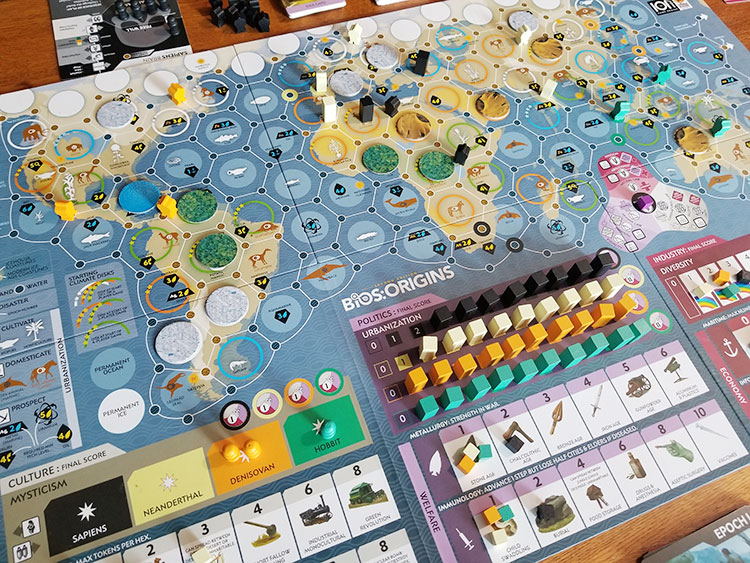
Game Experience:
Bios: Origins is a game with lots of rules to teach at the start, but individual turns are quick and simple to understand. If not for the terminology, actions could be summed up in just a few words. Specialize: place pawns based on position on the information track. Invent: take a card from the market with one of your pawns and if it meets the required number of total pawns. Most of the actions are as simple as this, and throughout a game of Bios: Origins, you will be committing to memory what most of the actions do. It may be a few turns before a card meets the requirements to be invented, so players familiarize themselves with the available actions, particularly in the two free rows provided to each discipline.
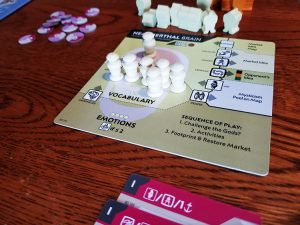
And this is a nice charm to Bios: Origins. A good chunk of the game can feel like a traditional engine builder as you invent new ideas and win auctions for actions that combo together. The combo a player wants to build is to further their scoring possibilities, furthering their board position, or dishing out some chaos for your opposition. Chaos (the in-game term) is a huge factor in the game. It covers up Diversity, which means scores toward economy are less. The tokens are housed on cards, which shutdown that entire row of possible actions. And if there are no more available spots for chaos, a violent revolt can happen, and the player is forced to change their ruling class and maybe lose some of their ideas.
The biggest problem I have with Bios: Origins is that the Rosetta Stone for the symbology is larger than some game’s full rules sheet. Forty-six different symbols are listed out in three columns, and while the descriptions are quite good, the pure number is daunting for new players. Quite a few, particularly the events, are ones that may be used once or twice in an entire game. There is also information that is missing from the Rosetta Stone that would be helpful to players, such as the bonuses received when a negotiation happens. It’s a crime that only one is included with a copy of Bios: Origins. Understanding if you are doing good is hard to visualize, which can be a big turn off for new players as well.
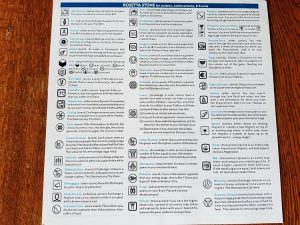
In addition to the learning curve and iconography, there are two major turn-offs for people considering the game: the length and some of the items included in the game. The game is long, particularly for new players. I said the minimum play time was around two hours, but in reality, it’s going to hover around the four-hour range more times than not.
But here’s the elephant in the room. This is a Sierra Madre game, so some of the included material is questionable at best. Actions and concepts like enslave, racism, genocide, menopause, and dictators can be uncomfortable to have in a game, let alone using them as actions during your turn. Part of me gets why Phil Eklund would include tough topics like these, as the human population across time has displayed these, and in many ways capitalized off them. So for a game that seeks authenticity in how Earth has progressed, I understand their inclusion. Nevertheless, it is a barrier one must navigate outside of the game during the teach and play.
Final Thoughts:
Bios: Origins is a surprise to me. I’m quite familiar with the Sierra Madre library, playing a lot of their games since Pax Porfiriana, but Bios: Origins may be the closest to feeling like an engine-building Euro. That’s not to say it’s one-to-one with games like Gaia Project or Scythe. The interaction and luck are much higher in Bios: Origins, to the point where interacting in the market, the board, and the scoring conditions are necessary to win.
There is enough chaos in the luck to feel like Earth changes, but not enough to destroy the entire game for someone. The first epoch can feel a tad sluggish, but it’s also observing the advancement of humans from 200,000 years ago. The learning curve is a tad harsh, and near-cringey inclusions may be reasons why people won’t want to purchase this game. But honestly, this deserves to be in the conversation with other great civilization games and heavy euros. Bios: Origins is an interesting blend of the two genres that uses mechanisms in a unique and fun fashion, while also injecting a ton of theme.
Final Score: 4 Stars – A lengthy, but solid, civilization game that explores nearly all aspects of human kind. Even the uncomfortable parts.
 Hits:
Hits:
• Simple turns once familiar with actions and terms
• Interaction comes in many forms
• Brain puzzle is a fun focus of the first act
• Thematic look at a civilization game
• Quality art and components
Misses:
• Reliance on Rosetta stone, and only one included
• Long, generally taking three hours or more
• Uncomfortable actions/concepts
• Early game can be slow due to lack of Free Will
• Hard to understand strategy for new players




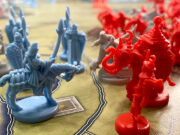


















Nice review! I’m not sure I’ll buy it but I’d be up for trying it.